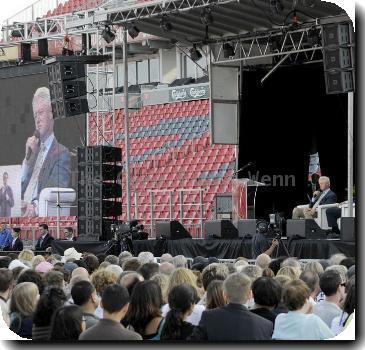More troops, peacekeepers expected for Haiti as aid groups and victims lament pace of relief
By Michelle Faul, APMonday, January 18, 2010
More US troops, UN peacekeepers expected for Haiti
PORT-AU-PRINCE, Haiti — Troops, doctors and aid workers flowed into Haiti on Monday even while victims of a quake that killed an estimated 200,000 people still struggled to find a cup of water or a handful of food.
European nations pledged more than a half-billion dollars in emergency and long-term aid, on top of at least $100 million promised earlier by the U.S.
But help was still not reaching many victims of Tuesday’s quake — choked back by transportation bottlenecks, bureaucratic confusion, fear of attacks on aid convoys, the collapse of local authority and the sheer scale of the need.
Looting spread to more parts of downtown Port-au-Prince as hundreds of young men and boys clambered up broken walls to break into shops and take whatever they can find. Especially prized was toothpaste, which people smear under their noses to fend off the stench of decaying bodies.
At one place, youths fought over a stock of rum with broken bottles, machetes and razors and police fired shots into the air to break up the crowd.
“I am drinking as much as I can. It gives courage,” said Jean-Pierre Junior, wielding a broken wooden plank with nails to protect his bottle of rum.
Even so, the U.S. Army’s on-the-ground commander, Lt. Gen. Ken Keen, said the city is seeing less violence than before the earthquake. “Is there gang violence? Yes. Was there gang violence before the earthquake? Absolutely.’”
Keen said some 2,000 Marines were set to join 1,000 U.S. troops on the ground and U.N. Secretary-General Ban Ki-moon announced Monday he wants 1,500 more U.N. police and 2,000 more troops to join the existing 7,000 military peacekeepers and 2,100 international police in Haiti.
While aid workers tried to make their way into Haiti, many people tried to leave. Hundreds of U.S. citizens, or people claiming to be, waved IDs as they formed a long line outside the U.S. Embassy in hopes of arranging a flight out of the country.
Roughly 200,000 people may have been killed in the magnitude-7.0 quake, the European Union said, quoting Haitian officials who also said about 70,000 bodies have been recovered so far.
EU officials estimated that about 250,000 were injured and 1.5 million were homeless.
Even many people whose houses survived are living outside for fear unstable buildings could collapse in aftershocks.
So many people have lost homes that the World Food Program is planning a tent camp for 100,000 people — an instant city the size of Burbank, California — on the outskirts of Port-au-Prince, according to the agency’s country director, Myrta Kaulard.
On the streets, people were still dying, pregnant women were giving birth and the injured were showing up in wheelbarrows and on people’s backs at hurriedly erected field hospitals.
Water began to reach more people around the capital and while fights broke out elsewhere, people formed lines to get supplies handed out by soldiers at a golf course. Still, with a blocked city port and relief groups claiming the U.S.-run airport is being poorly managed, food and medicine are scarce. Anger mounted hourly over the slow pace of the assistance.
“White guys, get the hell out!” some survivors shouted in the city’s Bel-Air slum, apparently frustrated at the sight of foreigners who were not delivering help.
Six days after the quake, dozens of rescue crews were still trying to rescue victims trapped under piles of concrete and debris.
“There are still people living” in collapsed buildings, U.N. humanitarian spokeswoman Elisabeth Byrs told The Associated Press. “Hope continues.”
She said some might might survive until Monday — and a few special cases could make it further: Rescuers pulled a 30-year-old man and a 40-year-old woman from a ruined supermarket on Sunday. Officials said they had had survived for so long by eating food where they were trapped.
Stunned by images of the disaster, the European Union Commission said it would contribute €330 million ($474 million) in emergency and long-term aid to Haiti.
EU member states also poured €92 million ($132 million) in emergency aid, including 20 million pounds ($32.7 million) from Britain and €10 million ($14.4 million) from France, which also said it was willing for forgive Haiti’s €40 million ($55.7 million) debt.
“The impact of this earthquake is magnified because it has hit a country that was already desperately poor and historically volatile,” said British Development Secretary Douglas Alexander.
U.S. officials, meanwhile, responded to criticism that they have given priority to military and rescue flights at the single-runway airport, which has room to park only a few planes at a time.
The U.N. World Food Program said American officials have agreed to a system giving humanitarian flights priority in landings.
French and Brazilian officials, as well as the Geneva-based aid group Doctors Without Borders, have complained that critical aid flights were not given permission to land.
With U.S. forces taking a major part in the relief effort, French Cooperation Minister Alain Joyandet said he wants the American role clarified.
“This is about helping Haiti, not about occupying Haiti,” Joyandet said.
Foreign Minister Bernard Kouchner, however, urged governments not to squabble over the problem, telling France-Info radio that “people always want it to be their plane … that lands.”
Former President Bill Clinton, the U.N. special envoy for Haiti, was scheduled to visit the country and meet with President Rene Preval.
Associated Press writers contributing to this story included Jennifer Kay, Mike Melia, Tamara Lush, Jonathan M. Katz, Gregory Bull and Edith M. Lederer in Port-au-Prince; Raf Casert in Brussels; Alexander G. Higgins in Geneva, and Jill Lawless in London.
(This version CORRECTS reference to EU pledge in 2nd graf.)
Tags: Accidents, Bill Clinton, Caribbean, Emergency Management, Europe, France, Gangs, Haiti, Latin America And Caribbean, North America, Search And Rescue Efforts, United States, Violent Crime, Western Europe





